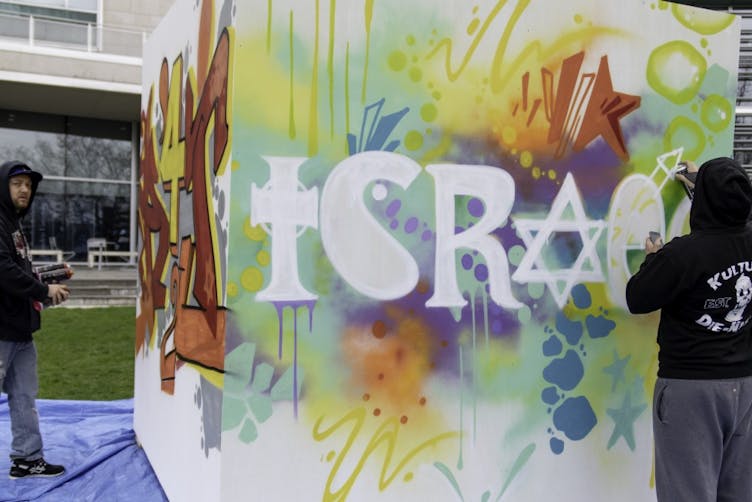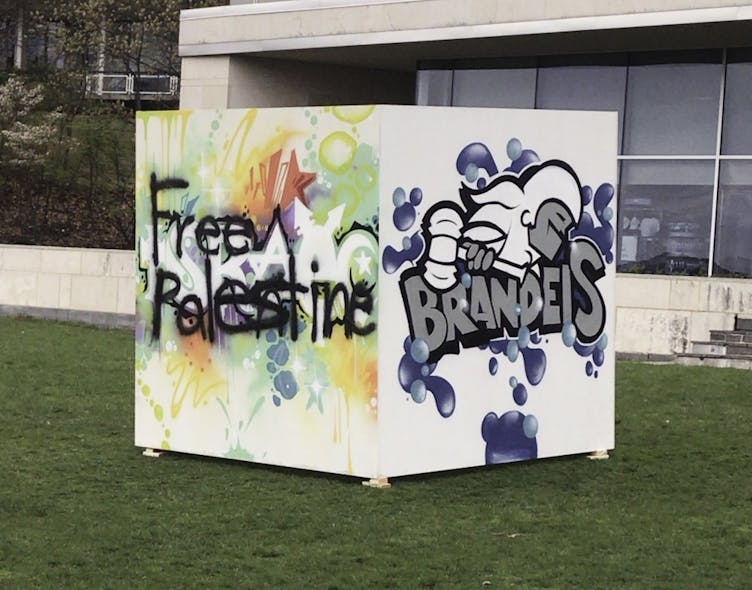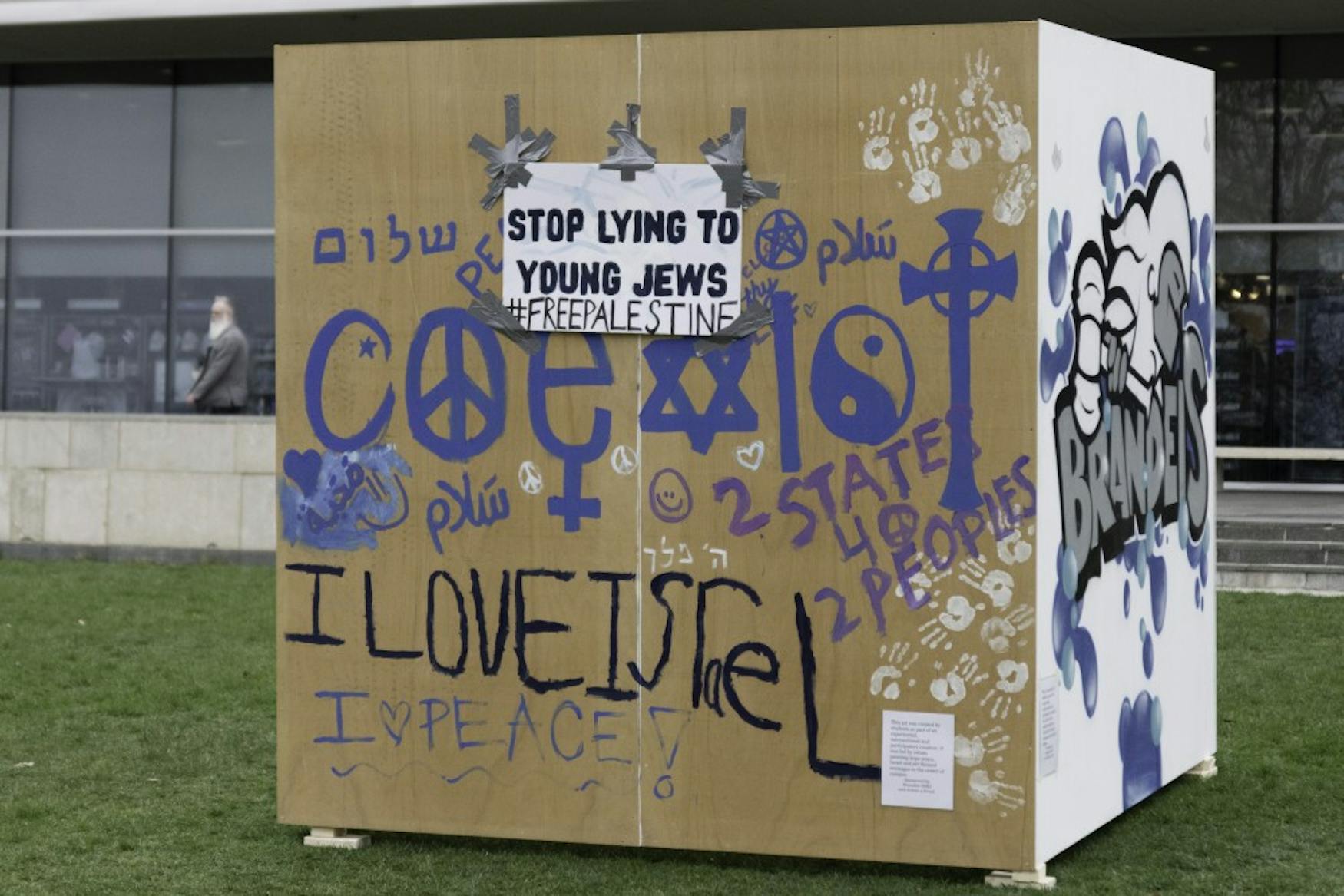Israel cube spray painting prompts backlash, investigation
IfNotNow Brandeis taped a sign to a pro-Israel graffiti cube, leading to a debate about free speech on campus.
In honor of Israel’s independence day, Brandeis Hillel hired Artists4Israel to create a graffiti cube expressing Israeli pride and highlighting the strong ties between Israel and many members of the Brandeis community.
Artists4Israel, a coalition of artists who, according to their website, “prevent the spread of anti-Israel bigotry through art and help communities and people affected by terrorism and hate,” decorated three sides of the cube with commissioned murals. The final side was designated for student expression.
Between the night of April 30 and the early hours of May 1, less than 24 hours after the cube was constructed, an unknown party spray-painted “Free Palestine” over one of the commissioned murals, which depicted the word “Israel” with letters in the shape of religious symbols. Soon after, Hillel members turned the face of the affected side of the cube around to create a “blank canvas,” later painting “Coexist” on the panel, per a statement from the group. The last stage of the cube’s transformation came when members of the Jewish student group IfNotNow Brandeis affixed a sign reading “Stop Lying to Young Jews #FreePalestine” to the same panel with duct tape, which was promptly removed by University officials.
The incident triggered a contentious debate over the rights of students and organizations to express pro-Palestine sentiments and prompted an exploration of the fine line between free expression and vandalism on campus.
The statements
As news of the incident spread around campus, several student groups made statements on social media. While some condemned the spray painting, others saw covering it up as censoring pro-Palestinian voices.
The first statement came from IfNotNow on the day of the incident and explained the reasoning behind adding the sign to the cube. IfNotNow called Hillel’s coverup of the initial graffiti “irresponsible” and wrote, “As a university committed to social justice, we should be promoting dialogue, not suppressing it.”
The group’s premise is to be a coalition of “progressive young Jews” who are against the “occupation” in Palestine, with its message centering around the idea that the state of Israel is “lying to young Jews” about what is occurring in occupied territories, per its Facebook page. In that vein, the statement called the cube “a beacon of propaganda and an embodiment of blatant nationalism.” The group also accused Hillel and the University of promoting a “one-sided narrative” that “stifle[d] the diversity of opinion” about Israel among Brandeis students and failed to address the “complexities of the occupation,” per the same statement.
IfNotNow held a “Propaganda Cube” debrief on May 3, to start a conversation about the “art installation,” according to the Facebook event description. The Justice reached out to representatives of IfNotNow for comment and received only a referral to the group’s social media posts.
On May 2, Brandeis Hillel’s Student Board put out its own statement, emphasizing the “real hurt to members of our community” caused by the spray painting of the cube. For Israeli Brandeisians and those with other ties to the country, the week was a time of celebrating the country and “all of the complexity that loving Israel, like loving any country, carries with it,” the statement explained. “We wish that those who defaced the exhibition in the Great Lawn—the first time or the second time—had decided to contribute to the project rather than vandalize it.”
The statement mentioned Hillel’s dedication to dialogue about the conflict, including subjects like Israeli politics that are often difficult to discuss. “Hillel works hard to offer different perspectives on the Israeli-Arab conflict. ... That is why we hosted two Palestinians this year in conversation with Israeli Jews – to model respectful disagreement and dialog,” Rabbi Seth Winberg, Brandeis Hillel’s executive director and the senior Jewish chaplain, wrote in an email to the Justice.
Other organizations made statements about the situation, though not involved. In an email to the Justice, Brandeis Israel Public Affairs Committee Vice President Jillian Fisch ’21 expressed BIPAC’s “disappoint[ment] to see that the original artwork of the artists was vandalized.” Fisch, however, emphasized that if the spray-painters graffitied the wall designated for student expression, she would have had no problem with the speech, because that “could have helped spur a conversation in a much more effective and constructive way.”

STAGE ONE: The initial mural when the cube was constructed.
On social media
Backlash over the spray painting spread swiftly in the University’s social media circles. In the Facebook group “Overseen at Brandeis,” one student posted a picture of the cube, allegedly to “spark a discussion.” In the nearly 300 comments on the thread, current students and alumni debated the nature of the graffiti and its links to oppression of different minorities. The discussion quickly became volatile and vitriolic.
One commenter invoked the University’s Jewish history to dismiss views that are critical of Israel, stating, “If you don’t like Israel or Jews, then simply don’t come to Brandeis. It’s not a place for you.” Around 20 people, including some opposed to the vandalism, refuted the commenter, emphasizing peoples’ right to diversity of opinion and accusing the individual of xenophobia.
Some used the conflict as a springboard to discuss racial issues, with one commenter saying students “give more fucks about a piece of WOOD than the black brown trans queer students of all legal statuses telling you they don't feel safe here,” referencing the May 1 #StillConcerned protest. Though the two events occurred on the same day, the protest and the cube graffiti were unrelated events concerning different causes.
The investigation
On May 10, the University and Hillel made a joint statement condemning the incident and announced that an investigation would be launched. It was signed by Winberg and Interim Vice President for Student Affairs Karen Muncaster and was published in BrandeisNOW.
The statement mentioned the recent Chabad synagogue shooting in Poway, California and the increased public safety presence at some Jewish events. Muncaster and Winberg wrote, “We are committed to providing a safe environment for all our students, and we realize many of our Jewish students may feel particularly vulnerable during times of tragic anti-Semitic incidents around the country.”
The two went on to write that the removal of the graffiti was “consistent with university policy” and that the University is “committed to freedom of expression, but … will not tolerate vandalism.”

STAGE TWO: The cube is spray-painted.
Image Courtesy of Mia Rubinstein.
President Liebowitz's statement
The situation was further inflamed with an email from University President Ron Liebowitz on May 15 informing the community of the results of the University’s investigation into the incident.
In the email, Liebowitz wrote that the “culprit” of the initial “Free Palestine” spray painting had not been found, but that the perpetrators of the second act of covering the mural, IfNotNow’s sign, could be “going through the university’s conduct process.”
While the email told of no new information about the perpetrators, the revelation that IfNotNow could be brought up on conduct charges brought a new wave of backlash from the community.
In a statement provided to the Justice, Students for Justice in Palestine condemned the potential conduct charges, stating that the “precedent is dangerous and harmful, and ... establishes our university as one which does not care about freedom of expression but instead perpetuates an echo chamber of unchallenged support of the Israeli government that these students dared to question.”
Liebowitz referenced the University’s “Principles of Free Speech and Free Expression,” writing that the perpetrators violated the policy. “If the messages left on the installation had been conveyed without vandalizing property and in accordance with university policy, the speech would have been protected. But this case involved vandalism targeted at a specific group,” the email stated. The group Liebowitz refers to is Brandeis Hillel, so according to Liebowitz, it “could easily lead one to interpret the acts as anti-Semitic.”
On May 16, IfNotNow published a second statement on its Facebook page decrying Liebowitz’s email and countering his accusations of anti-Semitism. “It is because of the Jewish tradition of repairing the world (tikkun olam), and not in spite of it, that we believe in the possibility of a Jewish community that seeks freedom and dignity for both Israelis and Palestinians,” IfNotNow wrote.
The Justice reached out to Liebowitz for further comment and received a response from Director of Media Relations Julie Jette referring back to his May 15 email. In an email to the Justice, Muncaster explained it is University policy not to comment on the ongoing conduct process.
The conduct process
To gauge the nature of the potential charges brought against IfNotNow, the Justice interviewed Nathan Greess ’19, a former chair of the Student Conduct Board.
When an individual goes through the conduct process, they can pick from three options: an administrative agreement, an administrative hearing or a Student Conduct Board hearing. In an administrative agreement, the student accepts responsibility for their actions and works with the hearing officer to determine appropriate sanctions. In an administrative hearing, the accused party can bring witnesses and evidence to be heard before one administrative officer. The Student Conduct Board consists of three students and two staff, with the addition of a neutral overseeing conduct officer, and tends to only cover more severe offenses, because the process takes longer. A student who goes through either hearing can appeal the decision if new evidence is found or if there was a procedural mistake during the initial process.
During the interview, Greess discussed Sections 6 and 7 of the Rights and Responsibilities, which is the rulebook used in conduct hearings. Section 6 concerns vandalism and respect of University property. Section 6.0 reads, “Respect, maintain, and preserve University grounds, academic and administrative buildings, residence halls, dining facilities, and associated structures, as well as faculty, staff and other students’ personal property.” Greess speculated that a conduct committee could “read it to violate ‘associated structure,’” and was certain that if IfNotNow were to be charged with a conduct violation, it would be a vandalism charge, as there is more guidance and precedent in dealing with vandalism cases.
Charging the group under Section 7, which concerns demonstrations, would be more difficult, he said. Under Section 7, a demonstration cannot “disrupt University operations or obstruct physical movement to, from, or within any place on the campus.” Greess said he interpreted the section “as having to do with physical demonstrations,” such as sit-ins, and “wouldn’t know how to go about” invoking Section 7 in any other type of demonstration. Under Section 7, the University can limit the “time, place, and manner” of protests, but IfNotNow did not physically demonstrate.
“I wouldn’t read it as a disruption … but I think it would be by administrators who don’t like demonstrations,” he said, explaining that the section is “written so broadly” that it creates “flexibility.”
Oftentimes, the Student Conduct Board will ask for past precedent in similar cases. However, Greess said, he has no memory of the University putting protesters through conduct charges, and he believes it would have been mentioned in the recent debate. While Liebowitz will often send out emails responding to demonstrations, the administrative response has typically ended there, he said. Most vandalism charges are related to stealing University property, rather than anything similar to the IfNotNow case. Greess was surprised upon learning that IfNotNow was undergoing conduct charges, as he felt “it’s a little bit risky, because it’s such a heated issue.”
He said, “My guess is it’s probably not a significant sanction, in any of the three options. … I’d be really surprised if this went to conduct board … it’s not really as severe as any of the stuff that conduct board gets.”
—Editor's Note: Editor Gilda Geist and Editorial Assistant Sarah Katz are members of IfNotNow, and Editor Liat Fischer is a member of Brandeis Hillel. They did not contribute to or edit this article.



Please note All comments are eligible for publication in The Justice.